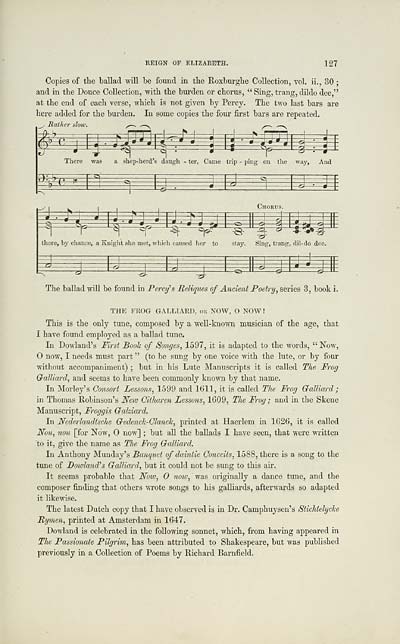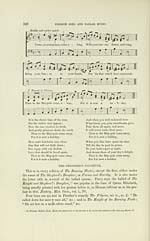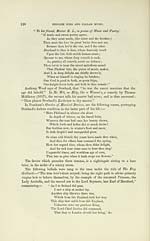Glen Collection of printed music > Printed text > Popular music of the olden time > Volume 1
(161) Page 127 - Frog galliard, or Now, o now
Download files
Complete book:
Individual page:
Thumbnail gallery: Grid view | List view

REIGN OF ELIZABETH.
127
Copies of the ballad will be found in the Roxburghe Collection, vol. ii., 30 ;
and in the Douce Collection, with the burden or chorus, " Sing, trang, dildo dee,"
at the end of each verse, which is not given by Percy. The two last bars are
here added for the burden. In some copies the foiu* first bars are repeated.
Rather slow. ^~. ^-v , — . , — ^
i
^g P^k^M4j
=it
There was a Bhep-herd's daugh - ter, Came trip - ping on the way, And
S
;??f;;
gs
^
22
h ^-i-^
t
Chorus.
;fl*
^
P '^ i"
^- ^
there, by chance, a Knight she met, which caused her to stay. Sing, trang, dil-do dee.
rsz
i ''' ^
The ballad will be found in Percy's Reliques of Ancient Poetry, series 3, booh i.
THE FROG GALLIARD, or NOW, O NOW !
This is the only tune, composed by a well-known musician of the age, that
I have found employed as a ballad tune.
In Dowland's First Book of Songes, 1597, it is adapted to the words, " Now,
now, I needs must part " (to be sung by one voice with the lute, or by four
without accompaniment) ; but in his Lute Manuscripts it is called The Prog
Galliard, and seems to have been commonly known by that name.
In Morley's Consort Lessons, 1599 and 1611, it is called The Prog Galliard ;
in Thomas Robinson's Weiv Citharen Lessons, 1609, Tlie Prog ; and in the Skene
Manuscript, Proggis Gcdziard.
In Nederlandtsche Q-edencli-Clanch, printed at Haerlem in 1626, it is called
Nou, nou [for Now, now] ; but all the ballads I have seen, that were written
'to it, give the name as Tlie Prog Galliard.
In Anthony Munday's Banquet of daintie Conceits, 1588, there is a song to the
tune of Dowland's Galliard, but it could not be sung to this air.
It seems probable that Noiv, noiv, was originally a dance tune, and the
composer finding that others wrote songs to his galliards, afterwards so adapted
it likewise.
The latest Dutch copy that I have obsei'ved is in Dr. Camphuysen's Stichtelycke
Rymen, priiited at Amsterdam in 1647.
Dowland is celebrated in the following sonnet, which, from having appeared in
The Passionate Pilgrim, has been attributed to Shakespeare, but was published
previously in a Collection of Poems by Richard Barnfield.
127
Copies of the ballad will be found in the Roxburghe Collection, vol. ii., 30 ;
and in the Douce Collection, with the burden or chorus, " Sing, trang, dildo dee,"
at the end of each verse, which is not given by Percy. The two last bars are
here added for the burden. In some copies the foiu* first bars are repeated.
Rather slow. ^~. ^-v , — . , — ^
i
^g P^k^M4j
=it
There was a Bhep-herd's daugh - ter, Came trip - ping on the way, And
S
;??f;;
gs
^
22
h ^-i-^
t
Chorus.
;fl*
^
P '^ i"
^- ^
there, by chance, a Knight she met, which caused her to stay. Sing, trang, dil-do dee.
rsz
i ''' ^
The ballad will be found in Percy's Reliques of Ancient Poetry, series 3, booh i.
THE FROG GALLIARD, or NOW, O NOW !
This is the only tune, composed by a well-known musician of the age, that
I have found employed as a ballad tune.
In Dowland's First Book of Songes, 1597, it is adapted to the words, " Now,
now, I needs must part " (to be sung by one voice with the lute, or by four
without accompaniment) ; but in his Lute Manuscripts it is called The Prog
Galliard, and seems to have been commonly known by that name.
In Morley's Consort Lessons, 1599 and 1611, it is called The Prog Galliard ;
in Thomas Robinson's Weiv Citharen Lessons, 1609, Tlie Prog ; and in the Skene
Manuscript, Proggis Gcdziard.
In Nederlandtsche Q-edencli-Clanch, printed at Haerlem in 1626, it is called
Nou, nou [for Now, now] ; but all the ballads I have seen, that were written
'to it, give the name as Tlie Prog Galliard.
In Anthony Munday's Banquet of daintie Conceits, 1588, there is a song to the
tune of Dowland's Galliard, but it could not be sung to this air.
It seems probable that Noiv, noiv, was originally a dance tune, and the
composer finding that others wrote songs to his galliards, afterwards so adapted
it likewise.
The latest Dutch copy that I have obsei'ved is in Dr. Camphuysen's Stichtelycke
Rymen, priiited at Amsterdam in 1647.
Dowland is celebrated in the following sonnet, which, from having appeared in
The Passionate Pilgrim, has been attributed to Shakespeare, but was published
previously in a Collection of Poems by Richard Barnfield.
Set display mode to: Large image | Transcription
Images and transcriptions on this page, including medium image downloads, may be used under the Creative Commons Attribution 4.0 International Licence unless otherwise stated. ![]()
| Special collections of printed music > Glen Collection of printed music > Printed text > Popular music of the olden time > Volume 1 > (161) Page 127 - Frog galliard, or Now, o now |
|---|
| Permanent URL | https://digital.nls.uk/91369379 |
|---|
| Shelfmark | Glen.254 |
|---|---|
| Additional NLS resources: | |
| Attribution and copyright: |
|
| Description | Scottish songs and music of the 18th and early 19th centuries, including music for the Highland bagpipe. These are selected items from the collection of John Glen (1833 to 1904). Also includes a few manuscripts, some treatises, and other books on the subject. |
|---|
| Description | The Glen Collection and the Inglis Collection represent mainly 18th and 19th century Scottish music, including Scottish songs. The collections of Berlioz and Verdi collected by bibliographer Cecil Hopkinson contain contemporary and later editions of the works of the two composers Berlioz and Verdi. |
|---|

